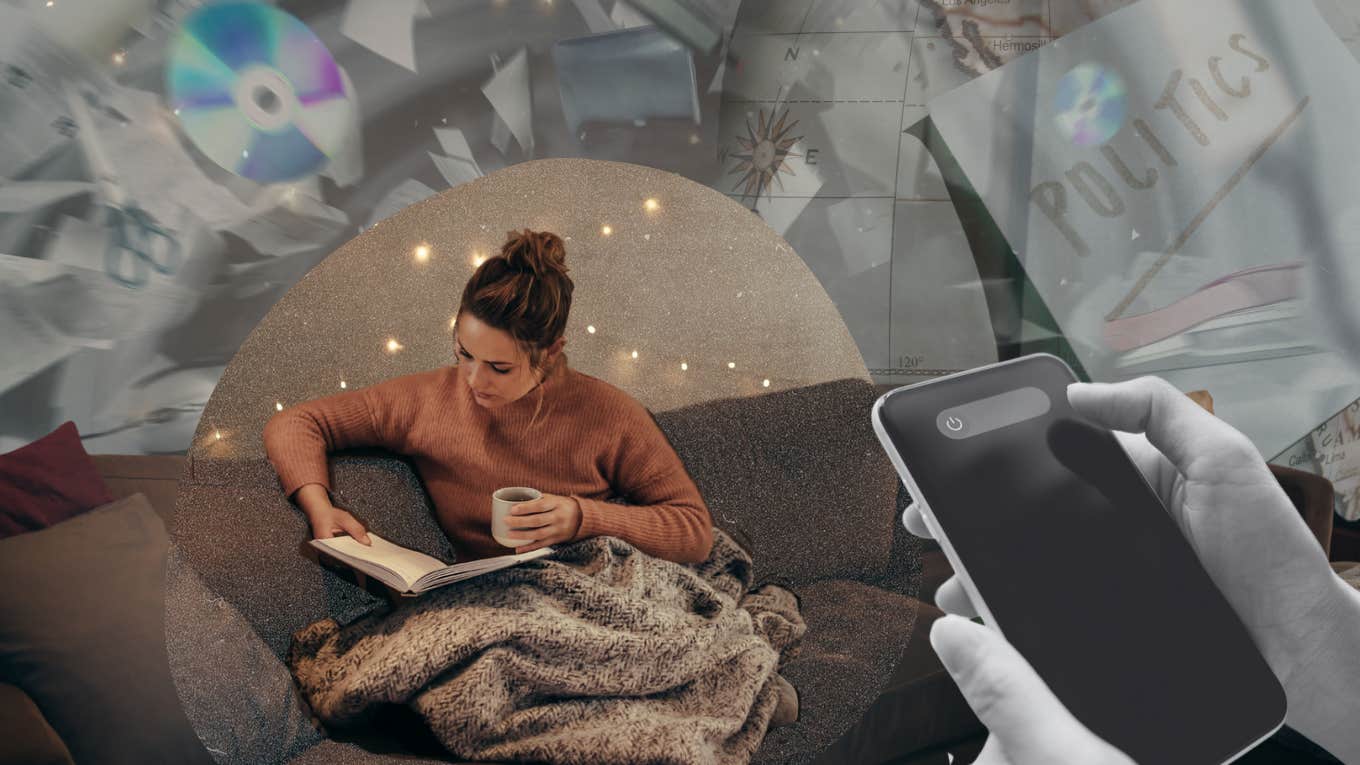9 Tiny Changes That Create Peace When Your Life Is Pure Chaos
Life moves forward always. Are you going with it or fighting against it?
 Tara Winstead, Jacob Lund, Nomadsoul1 | Canva
Tara Winstead, Jacob Lund, Nomadsoul1 | Canva As Dickens wrote in A Tale of Two Cities in 1859, “It was the best of times, it was the worst of times, it was the age of wisdom, it was the age of foolishness." Doesn't this ring so true today, too?
If you watch and read the news, you may become inundated with the negative, and the sensational, and feel incredibly stressed or anxious. Yet the whole world is not that. There are many great acts and human stories. You may have to search for them, but they are so uplifting.
We must be conscious of what we say to whom, and the people (and forms of communication) we have in our lives are truthful and transparent. Even the news and movies we watch are conversations. Sometimes, we make choices to balance the media meme of violence and negative news with positive and uplifting media.
From Falling Awake, Dave Ellis writes, “Moment by moment, we get to choose our conversations and community. What’s at stake is enormous—everything we say, hear, watch, listen to, read, and see. No choices are more powerful than these.”
Here are 9 ways to create peace in your life when the world is pure chaos.
1. Have a target, a personal mission statement, a life purpose, or a compelling future that draws you toward your desired life.
You can only prefer your future, not demand it. Planning and goal-setting help, but remember that even airplanes are off-target 90 percent of the flight. Lots of minor adjustments are made to what is occurring in the now.

Photo: Lenar Nigmatullin via Shutterstock
2. Have an uncluttered life.
This includes physical and emotional clutter. Do a clean sweep of unwanted things, and then work on where and with whom you can be "emotionally naked". Work on life’s incompletions. It is said that we all come with baggage. A true friend will help you unpack!
3. Live in the present.
Sure, you have to envision and think about your future, but it is unknown and made up. Even your story about the past is just your story. It has been said, “The past is history, the future but a mystery. The present is a gift. That is why it’s called the present.”
4. Create an energy drain-free zone.
If there are things that are bugging you, what I call “gnats and nuisances,” things you are frustrated by, then follow the guide of “do it, dump it, or delegate it (or delay it).” By choosing not to tolerate energy drainers, you can take action by doing something to take care of the toleration. Or you can dump it. Forget about it, especially if there is nothing you can do. Get it off your list. Or you can delegate the challenge. Hire someone who can fix it, complete a task for you, or take it off your radar. Or delay it. Deal with it later, but don’t worry about it today. Why waste energy on it? The key here is not to deny it and forget to do one of the other strategies. Just give it time and revisit.
5. Give yourself extreme self-care.
Be good to yourself, extremely good. Reward yourself with something to give you energy rather than drain you. Get a foot massage. Go to the beach, the woods, the mountains, or the lake. Go out for a special treat. Do this periodically, and you build up reserves!
6. Understand the myth of work/life balance.
Have a center point to come back to. Balance is temporary. But the practice of daily centering and coming back to balance creates a more sturdy sense of security.
7. Say no and yes with conviction.
When I coach my clients on living their best lives, we get to clarify their purpose early on. When they have requests from others or demands of the job, they can consider the request for their time and energy.
If it fits with their purpose statements and values, they say yes. If it does not, they say no. Or at least they can say, “Maybe. Let me think about it.” You can do the same thing. Many people do not tell the truth when others ask them to commit to something or help another, and that lack of communication costs them dearly.
8. Choose to under-promise and over-deliver.
This is a hallmark of the coaching profession and that of personal or business development. It does not mean making promises or commitments that are not well-conceived or important. But it does allow one to have some leeway.
For example, if at work, you are asked when you can have a proposal on your supervisor’s desk. State you can have it in a week and deliver in five days. Do this instead of promising something you can’t deliver or will not be polished and ready for review. I’m sure you can think of many areas in personal or family life where this same strategy can be helpful.
9. Respond, do not react.
This is critical to living a less stressful life on purpose. As humans, we have a natural, built-in reaction of fight-or-flight. But our evolution also allows us to pause and survey the options available instead of an immediate knee-jerk reaction.
Even first responders and emergency professionals are trained to quickly ascertain choices based on their training instead of a less trained person reacting with fear, paralysis, inaction, or unhelpful action. To design a preferred personal future, you must have a plan and be present in life’s natural flow.
Our lives are shaped by incompletion, fear, attachment, addiction, unmet needs, procrastination, and tolerance. Like barnacles on the hull of a boat, we must have an annual cleaning, at minimum, for smoother sailing.
Clean up your clutter, unfinished business, and wounds. Orient your life around your values and gifts. Be an observer of life. Be curious and learn what you are having the opportunity to learn. Life moves forward always. You cannot step into the same river twice.
Dr. Pat Williams is a psychologist, Master Certified Coach, and Board Certified Coach.

